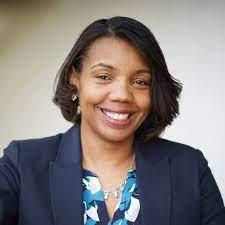- Council of the Great City Schools
- Two Urban Educators Selected As ‘Leaders to Learn From’
Digital Urban Educator - March 2024
Page Navigation
- Urban School Districts Show Gains in Recovery From Pandemic Slump
- Education Secretary to Speak at Legislative/Policy Conference
- New Superintendents Named in Memphis, Albuquerque and Dayton; Longtime Leader to Step Down in Fresno
- Council Offers Math, Science, Scholarships to Big-City Students
- Detroit School Celebrated as Winner of the Richard M. Robinson Literacy Champion Award
- Documentary Featuring L.A. Student Musicians Wins an Oscar
- Two Urban Educators Selected As ‘Leaders to Learn From’
Two Urban Educators Selected As ‘Leaders to Learn From’
-
Aleesia Johnson made history in 2019 as the first Black woman to lead Indianapolis Public Schools. However, her tenure began with a formidable challenge. Confronted with issues of crumbling infrastructure, declining enrollment, and racial disparities, Johnson launched the Rebuilding Stronger initiative. The plan addresses issues from school buildings to racial gaps, emphasizing stability and equity and aims to boost student achievement and reduce racial disparities in the long term.

Johnson was one of two big-city school educators recently featured in the 2024 class of Education Week’s Leaders to Learn From, recognizing excellence in school district leadership.
Under the Rebuilding Stronger initiative, the Indianapolis school system has consolidated all schools into four attendance zones, with each zone designed to reflect the same racial makeup as the district as a whole, which includes approximately 40 percent Black, 34 percent Hispanic, and 20 percent white students.
But the plan has faced opposition from charter and community groups over the use of school buildings and concerns from the community over school closures, staff reassignments, and construction projects.
Johnson has worked to build support for the plan, holding more than 100 feedback meetings focusing on explaining how parts of the restructuring will work and why they are important, such as restructuring small K-8 schools into larger P-5 primary schools and eight new 6-8 middle schools. Johnson believes these actions will result in larger schools able to provide a broader curriculum and better opportunities for students.
While the initiative will not be complete until 2025, the district is starting to see positive results, with improvements in graduation rates across all racial and economic groups. The district also passed a $410 million capital bond in May to update all schools and build a new elementary campus, and the district negotiated a new two-year contract for teachers in November to include raises.
“What I have come to realize is that, regardless of your governance structure or your reporting structure, schools are living, breathing organizations that are both a reflection of and a window into what we have, as a community, decided to invest in and support,” Johnson said. “You can have schools of all types that are doing dynamic, incredible work, and some schools that are really struggling—it’s really about how we are aligning systems of support and enabling conditions around schools to best set them up for success. That’s really the bottom line.”
LeeAnn Kittle, the executive director of sustainability for Denver Public Schools, is reshaping the district’s environmental footprint with an innovative approach that actively involves students. Recognizing their potential as powerful ambassadors for sustainability, Kittle oversees a transformative climate plan for the school district that helps students make their schools more environmentally sustainable.

Kittle has led the 88,000-student district to significant milestones in just three years, from solar panels powering schools to leading the state in electrifying the school bus fleet. In 2022, students involved in creating the climate action policy received the President’s Environmental Youth Award.
The district’s climate action plan, which started as a verbal commitment, has transformed into a five-year road map with clear objectives: to reduce natural resource consumption and waste and slash overall emissions by at least 90 percent by 2050. A project-based learning initiative is one of the key initiatives driving change in the district. In collaboration with the city, funding of up to $25,000 is allocated for student-led climate action projects, empowering students to spearhead environmentally sustainable changes within their schools.
“Being able to give students the opportunity to work on project-based learning [in] sustainability helps them recognize their skill sets that maybe a traditional classroom does not provide,” said Kittle. “I want these kids to know: Just because you can’t sit down at a desk, read something, and get straight A’s, doesn’t mean that you don’t have something to offer this world.”
Media Contact:
Contact Name
Contact@email.com
(000) 000-0000
Contact Name
Contact@email.com
(000) 000-0000
Contact Name
Contact@email.com
(000) 000-0000
Media Contact:
Contact Name
Contact@email.com
(000) 000-0000
Contact Name
Contact@email.com
(000) 000-0000
Contact Name
Contact@email.com
(000) 000-0000


